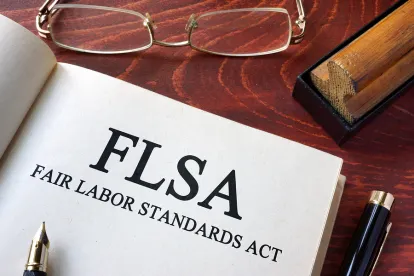Does a plaintiff’s allegation, that he was about to join a pending Fair Labor Standards Act (FLSA) collective (class) action against his former employer, combined with the employer’s knowledge that he was a potential class member, sufficiently constitute being “about to testify” in an FLSA proceeding, such that former employer’s actions in prohibiting the plaintiff from working for its subsidiary might constitute unlawful retaliation under the Act?
Yes, according to the U.S. Court of Appeals for the Third Circuit. Uronis v. Cabot Oil & Gas Corp., 2022 U.S. App. LEXIS 25727 (3d Cir. Sept. 14, 2022). The Third Circuit has jurisdiction over the federal courts in Delaware, New Jersey, Pennsylvania, and the Virgin Islands.
Background
The FLSA prohibits discrimination against employees who have engaged in “protected activity” which, in part, includes having “testified” or being “about to testify” in any FLSA-related proceeding. 29 U.S.C. § 215(a)(3). In February 2019, a former coworker of plaintiff Matthew Uronis filed a collective action lawsuit against both Cabot Oil & Gas Corporation and a transport and rental company, claiming that the two companies were joint employers and that they failed to properly pay overtime to members of the class, in violation of the FLSA. Uronis, who also had been employed by the transport and rental company – and therefore arguably had been jointly employed by Cabot – fell within the putative class of individuals set forth in the collective action complaint.
According to the Complaint, in August 2019, Uronis applied for a position with GasSearch Drilling Services Corporation (GDS), a subsidiary of Cabot. On August 28, 2019, a GDS manager sent Uronis a text message unequivocally stating that, despite his clear qualifications, he could not hire Uronis because he was a putative member of the collective action lawsuit against Cabot and the purported joint employer. That same day, Uronis signed his consent to join the collective action and, although he already had contacted the lead plaintiff about testifying in that lawsuit, he had not informed anyone at Cabot or GDS that he planned to do so.
Uronis subsequently filed his own collective action, against Cabot and GDS, alleging they violated Section 215(a)(3) of the FLSA when GDS refused to hire him and others because they were “about to testify” in his former coworker’s lawsuit. In support of this retaliation claim, Uronis referenced the text message from the GDS manager. The defendants filed, and the district court granted, a motion to dismiss on the basis that Uronis had not pled conduct constituting protected activity under Section 215(a)(3).
The district court concluded that Uronis was not “about to testify” because he had not alleged he was scheduled to provide testimony in the underlying collective action. “Had Congress intended [Section 15(a)(3)] to apply to scenarios in which putative collective action members might potentially testify at some point in the proceeding, it would have said so,” concluded the trial court. On the contrary, it continued, “Section 15 uses the phrase ‘about to testify,’ suggesting some sense of certainty and immediacy as opposed to mere possibility.” In this case, Uronis had not alleged that he or other putative class members “were subpoenaed to testify or that they were told they would be called upon to testify, nor ha[d] he alleged any facts that Defendants had a reason to know that [he] or any others would be testifying.” Uronis appealed and the Third Circuit reversed.
Third Circuit Decision
Noting first that “Congress included in the FLSA an antiretaliation provision . . . to encourage employees to assert their rights without ‘fear of economic retaliation [which] might often operate to induce aggrieved employees to quietly accept substandard conditions,” the Third Circuit stated that the FLSA “must not be interpreted or applied in a narrow, grudging manner.” In support of this position, the Court of Appeals cited to the U.S. Supreme Court’s decision in Kasten v. Saint-Gobain Performance Plastics Corporation, 563 U.S. 1 (2011), in which the Court held that an oral complaint of an FLSA violation constitutes protected activity, even though the statute (in a companion subsection) refers to a complaint that has been “filed,” which most commonly is interpreted to require a written document.
In so holding, the Supreme Court reasoned that to limit the scope of Section 15(a)(3) to the filing of written complaints would foul Congress’ intent by ‘prevent[ing] Government agencies from using hotlines, interviews, and other oral methods of receiving complaints’ and ‘discourag[ing] the use of desirable informal workplace grievance procedures to secure compliance with the [FLSA].’” The Court further noted that it had interpreted an analogous provision of the National Labor Relations Act (NLRA) to protect conduct not explicitly listed in that NLRA, specifically, to extend anti-retaliation protection to individuals who merely had participated in a National Labor Relations Board investigation, even though the language of the NLRA itself referred only to those who had “filed charges or given testimony.”
The Court of Appeals further noted that previously, in Brock v. Richardson, 812 F.2d 121 (3d Cir. 1987), it had extended the protections of Section 215(a)(3) to individuals whom the employer believed had filed a complaint with the Department of Labor, even though they had not actually done so. “Even though the statute could be narrowly read to not include retaliation based on perception, such retaliation ‘creates the same atmosphere of intimidation’ as does discrimination based on situations explicitly listed in Section 15(a)(3),” the Court of Appeals reiterated, adding that “[s]uch an atmosphere of intimidation is particularly repugnant to the purpose of the FLSA in the context of collective actions.” Similarly, “[i]f employers can retaliate against an employee because the employer believes the employee has or will soon file a consent to join an FLSA collective action, this enforcement mechanism – and employee protection – will be gutted.
However, added the Third Circuit, “Section [2]15(a)(3) is not a per se bar against any adverse employment action against an employee who is or might soon be a collective action member. Rather, it bars discrimination because of protected activity.” Again citing to Kasten, the Court of Appeals emphasized that to qualify as arguably protected activity, the employer must be given “fair notice” that a reasonably detailed and clear complaint, whether oral or written, has been asserted (as in Kasten) or, as here, that the individual was “about to testify” in an FLSA proceeding (as the Third Circuit now broadly interprets that phrase) and there must be plausible evidence (or allegations) that the employer was aware of the conduct.
In this case, the district court implicitly interpreted the definition of “testify,” as set forth in Section 215(a)(3), to require that an employee be scheduled or subpoenaed to testify, a “narrow interpretation is not consistent with the FLSA’s purpose, or with Kasten and Brock. On the contrary, the Third Circuit said:
The reasoning of Kasten and Brock compel the conclusion that to ‘testify’ under Section [2]15(a)(3) includes the filing of an informational statement with a government entity. A consent to join a collective action is just that: it is an informational statement (that an employee is similarly situated to the named plaintiff with respect to the alleged FLSA violation) made to a government entity (the court).
Accordingly, concluded the Third Circuit, “an employee testifies under Section [2]15(a)(3) when the employee files a consent to join an FLSA collective action.”
Moreover, again in support of the FLSA’s broad remedial purpose and contrary to the reasoning of the district court, the Court of Appeals held that “‘about to testify’ includes testimony that is impending or anticipated, but has not been scheduled or subpoenaed.” As set forth in several other district court decisions, “‘about to’ . . . includes activity that is ‘reasonably close to, almost, on the verge of,’ or ‘intending to do something or close to doing something very soon.’” This includes individuals who, like Uronis, intended to soon file his consent to join the collective action and testify in that lawsuit, the Third Circuit noted. Finally, the Court of Appeals held, Uronis had sufficiently pled – as evidenced by the text to him from the GDS manager – not only that Cabot and GDS were aware, or at least assumed, that he would join the collective action, but that GDS was flatly refusing to hire him for this very reason. Based on these allegations, “[i]t is plausible that [GDS would not hire Uronis] because they anticipated [he] and his former co-workers would soon file consents to join the putative collective action, or otherwise provide evidence relating to it.” Accordingly, the Third Circuit said, the complaint should not have been dismissed on the pleadings and the case was due to be remanded for further consideration.
The Takeaway
The Third Circuit’s decision makes clear that, at least in the courts under its jurisdiction, the FLSA’s retaliation provisions extend to circumstances beyond the traditional employer-employee relationship. Thus, employers should be cautious in their dealings with both former and prospective employees (actual or alleged) to ensure that they are not basing employment decisions on activity, or even reasonably likely activity, that might be construed as protected conduct under the Act’s retaliation provisions.





 />i
/>i
